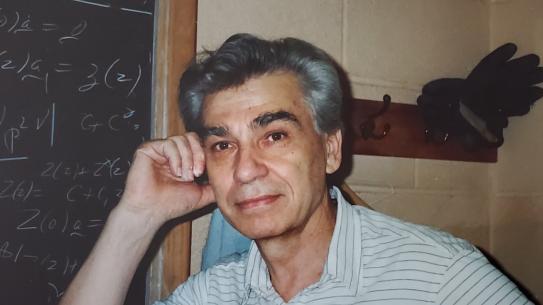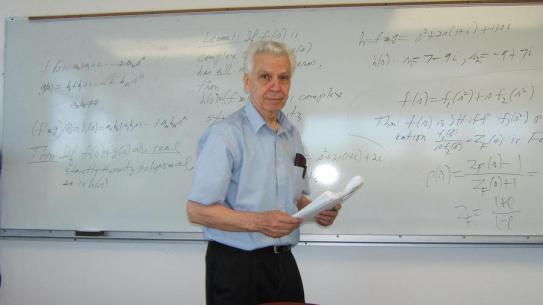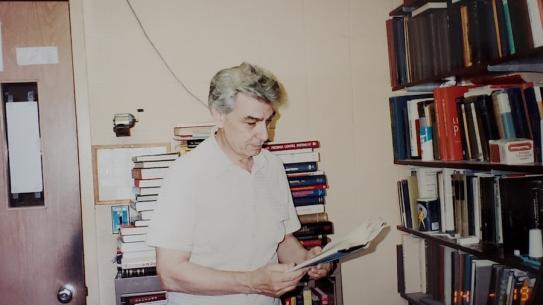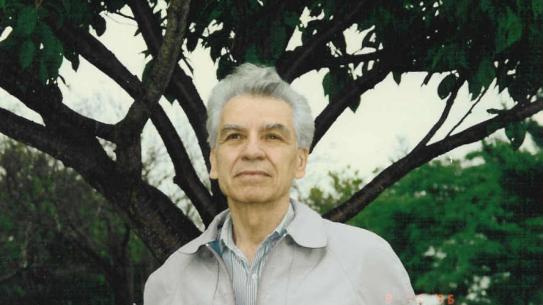In Memoriam: Dante C. Youla
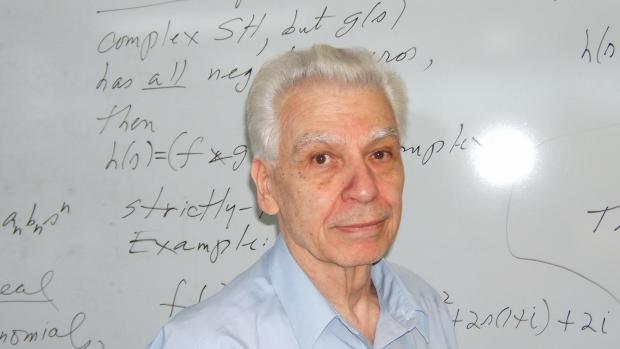
The entire NYU Tandon community mourns the August 13, 2021, passing of Presidential Fellow and Professor Emeritus of Electrical and Computer Engineering Dante C. Youla, a towering figure in his field.
It is easy to list Professor Youla’s laurels: the 1965 IEEE W.R.G. Baker Award for the paper “A New Theory of Broad-Band Matching,” the 1988 IEEE Control Systems Science and Engineering Award "for original contributions in the areas of circuits, systems and control theory, and the rigorous solution of engineering problems,” the 2005 Vitold Belevitch Award from the IEEE Circuits and Systems Society. Such a list could go on and on: his 1982 election to the National Academy of Engineers, among the highest professional distinctions that can be accorded to an engineer, in recognition of his contributions to broadband matching in microwave networks and to optimal controllers for multivariable feedback systems; his name immortalized in the Youla–Kucera parametrization in control theory. (Department of Electrical and Computer Engineering Chair Ivan Selesnick recalls, “When I was a Ph.D. student, I shared an office with two control theory Ph.D. students, and I heard ‘Youla parameterization’ nearly every day!)
Those facts give some hint of his brilliance, but do little to convey what he meant to a school whose faculty he joined in 1955, more than six decades ago.
“It would be difficult to overstate the esteem in which Dan was held, both in the broader worlds of electrical engineering and control theory and right here within our school community,” Dean Jelena Kovačević, said. “I have heard the words legend and role model used to refer to him, and I think those are very apt. It is inspiring that he worked well into his 90s, publishing his final paper just last year. He was fond of saying, ‘Being smart alone isn't enough; there are a lot of smart people, you have to work hard as well,' and I hope that’s a sentiment we all convey to our students.”
Memories of Dante C. Youla
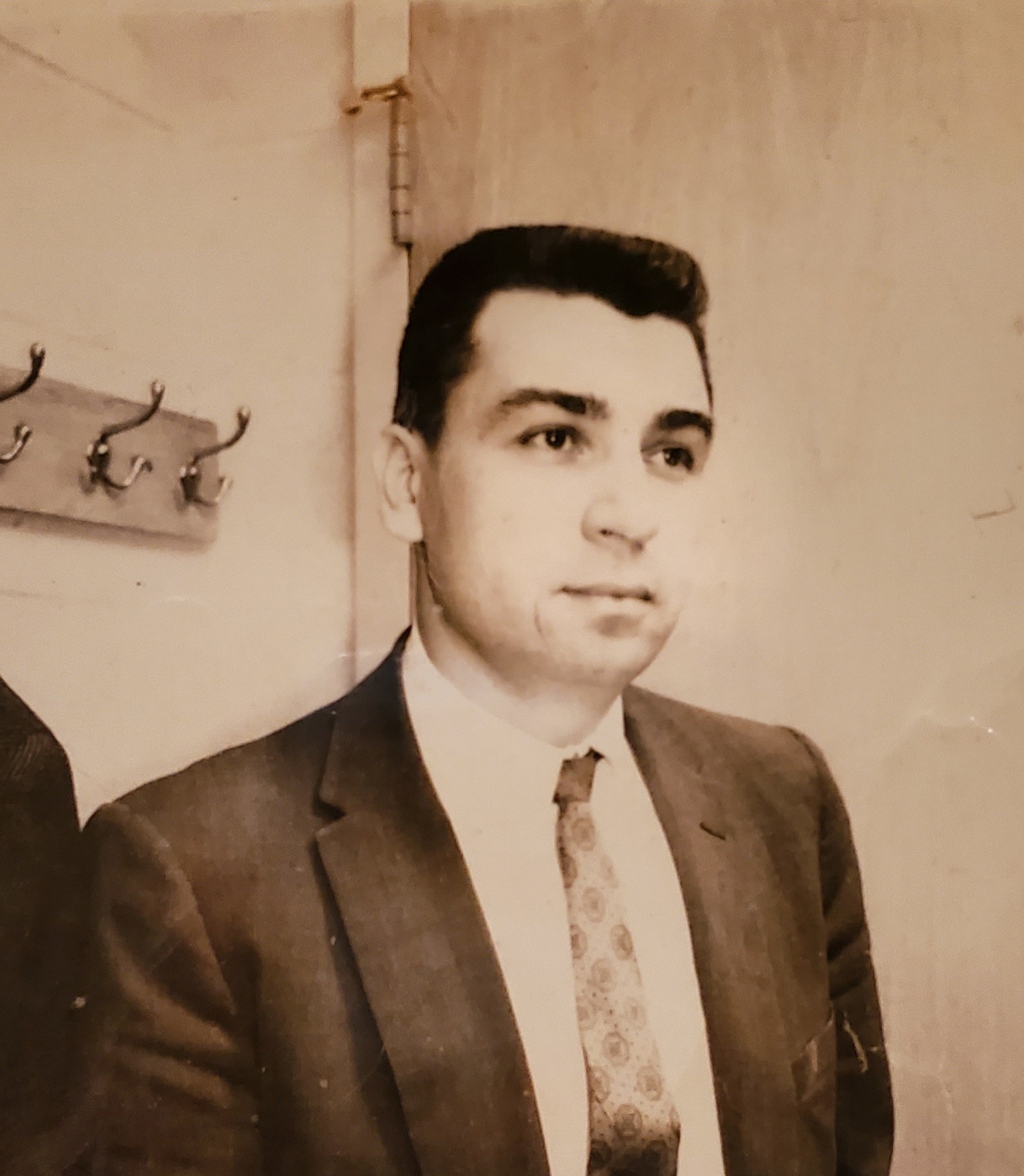
I am deeply sorry to hear of Professor Youla’s passing. He contributed significantly to several fields and societies, including control. May he rest in peace."
— Assistant Professor of Electrical and Computer & Mechanical and Aerospace Engineering Farokh Atashzar
Dan was the most intelligent of all the smart and creative faculty that made up the Microwave Research Institute."
— Professor Emeritus of Electrical and Computer Engineering Henry Bertoni
I first met Dante Youla in the early 1960’s at the Polytechnic Institute of Brooklyn. He was interested in results I had obtained for feedback systems with a periodically varying gain in the closed-loop. He showed me how to extend the results to the more general multivariable case. I added some application examples and published the work in the July, 1964 issue of the IEEE Proceedings. I acknowledged his help, but he said I should not include him as coauthor because the basic idea was mine; he only helped with the mathematics! Such was the generosity Dan exhibited with colleagues and students. He was always willing to help others and collaborated with many. We were both named authors on each of nine peer-reviewed papers published from 1968 through 2001.
Dan’s research interests have generated important results in several areas: Information Theory, Network Synthesis, Optimal Estimation and Control, Power, and Image Restoration. He has received several best paper citations and has received a number of awards. He taught both undergraduate courses (e.g., sophomore circuits, machines, and electromagnetics) and graduate courses (e.g., network synthesis, matrix theory, and optimal control). He included many of his accomplishments in his book Theory and Synthesis of Linear Passive Time-Invariant Networks published in 2016 by Cambridge University Press.
Dante Youla was a Presidential Fellow of the New York University Tandon School of Engineering, and a Professor Emeritus of the Department of Electrical and Computer Engineering. He was awarded the IEEE Circuits and Systems Society Vitold Belevitch Award for his fundamental contributions to the field, and the Youla-Kucera parametrization of stabilizing controllers honors his contribution to this important concept. He was a Member of the National Academy of Engineering, and a Fellow of the IEEE.
Dan’s other interests over the years have included playing checkers, handball, and judo with the same intensity as his research and teaching. This reminds me of a true story. For many years a group of us would have lunch every Friday at a favorite Chinese restaurant. One day we walked toward the restaurant talking intensely as usual about research and/or education. So intensely as a matter of fact that we did not realize until we tried to open the door to the restaurant that the restaurant had no roof: there had been a fire the previous day and the door was locked! Another story of this kind concerns a night Dan went to the gym. When leaving to go home he could not find his parked car. He called the police and reported his car had been stolen. They were not happy when leaning against the only remaining car in the parking lot he realized his mistake. The car he was leaning on was his wife’s.
Dan was a friend, a colleague, and a mentor. He helped me to become a better teacher and researcher. We worked together for some 55 years and I will miss him.
—Professor Emeritus of Electrical and Computer Engineering Joseph Bongiorno
I'll never forget his classes and mentorship. He was truly one of a kind."
— Industry Associate Professor Matthew Campisi
Dante was one of the giants that made Poly famous for decades; in fact, I knew of his achievements way before I came to Poly. His passing is a huge loss for us, and for the entire electrical engineering community."
— Professor Emeritus of Electrical and Computer Engineering David C. Chang
This is a great loss for our department and electrical engineering in general. Professor Youla had deep insights into all areas of electrical engineering and physical sciences in general. Although his research was not directly in electromagnetics, his circuits network theories had deep insights into electromagnetics and contributed significantly to microwave networks systems. He was probably the smartest and most insightful of all microwaves and electromagnetics researchers from our famous microwave research institute."
—Associate Professor of Electrical and Computer Engineering Nirod Das
I’m so saddened to hear of the passing of Professor Youla. He was a genius and a great mind of all time. His pioneering work has put Brooklyn Poly on the world map. It's a huge loss for the academic community, especially the control systems society.
Usually I don't run after celebrities. Youla and Kalman were two exceptions. When I got the offer from PolyU in the late ‘90s I received warm congratulations from several top-notch people in the controls community. The first thing I decided to do was to pay a visit to Professor Youla on the Long Island campus. The visit was fruitful and I learned a great deal from him. I still remember that when I expressed an interest in generalizing his "Youla Parametrization" of all stabilizing controllers from linear to nonlinear systems, he pointed out a few refs of others to me. Later on, upon reading the papers, I found out that they were not as elegant as the original results of Youla. As others have pointed out, if you had a problem that you didn't know how to solve, give it to Youla and he would give you the answer right away. For the generalization problem, if Youla himself did not solve it, it is most likely that the problem was too tough to be solved. I am glad that I did not pursue the generalization of Youla's parameterization after my visit to him. The other issue we chatted about during the visit was funding. I said that it had gotten harder to obtain funding in the controls area after the former Soviet Union collapsed. He reassured me that with good work at hand, we would be rewarded one way or the other.
Youla's work and creativity will continue to influence generations of students and colleagues."
— Professor of Electrical and Computer Engineering Zhongping Jiang
Dan's contributions in many fields will continue to resonate long after his passing. His work in system and control theory is well known in our society and his seminal contributions to Wiener-Hopf design and parametrization of all stabilizing controllers with our other colleague, Professor Joseph J. Bongiorno, carry his name with it as Youla's parametrization of all stabilizing controllers.
I remember Dan's sharp and insightful questions during my interview talk and many seminars I attended. It was colleagues like him that made me interested in joining Brooklyn Poly. There are many personal stories about Dan from all of us who knew him, and he will be dearly missed. He was indeed one of the most gifted analytical minds in our community ( as well as other areas), and he will never be replaced."
— Professor of Electrical and Computer Engineering Farshad Khorrami
Unfortunately, I did not have a chance to meet him in person, but I know that he was a pioneer and a brilliant mind in several areas, especially in control. May he rest in peace."
— Assistant Professor of Electrical and Computer & Mechanical and Aerospace Engineering Giuseppe Loianno
I regret never having the opportunity to meet Dante. I purchased his book several years ago, and more than ever, I believe that our students could benefit from learning classical network theory."
— Distinguished Industry Professor Tom Marzetta
I remember Dan attending a talk I gave on my research. I was nervous because if there was a flaw in my work, Dan would find it. Fortunately for me, another faculty member took up all the time asking me some very simple questions. Thankfully, no tough questions from Dan.
Rest In peace, Dan."
— Professor of Electrical and Computer Engineering Shivendra Panwar
Professor Youla was a rare combination of talents: extreme mathematical skills with an ability to connect them with Electrical Engineering problems. Matrix Algebra came effortlessly to him, with no second thoughts whatsoever. Network theory was his passion, and he made several fundamental contributions, with step-by-step complexity reduction being a fundamental theme in terms of his synthesis work. As others have pointed out, his contributions to system theory and controls are equally important. In communication theory I believe he had solved the first multichannel optimal receiver problem in colored noise. Power system theory, three phase induction motors, graph theory, probability — these were all among his passions. Nothing escaped his attention. He was a problem solver: You gave him a problem that you couldn’t solve, and he would almost always solve it. Once he solved a problem, he would move on to the next one. Even in retirement he would come to the office by 9 AM to start working as if getting ready for an exam. In later years, he’d leave by 4PM or so. You’d either talk shop with him or leave: he had little time for casual chatter.
There was a certain kind of frankness or freshness about Professor Youla that I cannot explain. I loved to hear him simply talk. He was always extremely generous to everyone — students, faculty, strangers asking for technical help — with his time and with his brain. He was quite extraordinary in that sense.
He was a master teacher, as many can attest. I don't remember the exact years, but around 1987 to 1992 I think, I used to attend his graduate Network Theory class in Farmingdale, which in those days lasted from 6 to 9 PM. After the class we would talk, then I would go back to Brooklyn. I think I attended the same class back-to-back, three years or so in a row, just like kids see the Nutcracker year after year. I knew the next scene, but I just enjoyed his performance. He was such an orator and had excellent classroom skills. I have never seen anything like that in any other class.
He took the world as is, dealt with everyone as they were: nothing more, nothing less. He lived in the present. That aspect of him was very noteworthy. He had no heroes, and he feared no one. He admired talent, though. I remember him talking about his encounters with Darlington, Shannon, and several others. He was deeply attached to his family.
With Professor Youla gone, the world appears a bit emptier to me now."
— Professor Unnikrishna Pillai
While I never had the chance to meet him, I knew of his work as a Ph.D. student (I was a control theorist at that time.) In fact, my thesis used the "Youla parameterization" as part of the proof of one of the theorems. This is a very deep loss."
— Professor of Electrical and Computer Engineering Sundeep Rangan
When I was taking my oral qualifying exam for my advisor, Frank Kozin, I walked into a small office with Dan Youla, Joe Bongiorno and Athanasius Papoulis. You can imagine how nervous I was. Papoulis asked me some standard signal processing questions, and Joe Bongiorno asked some reasonable control questions, I think, and I felt things were going well. Then, with only a few minutes left, Dan got up and put on the board a diagram of a nonlinear, time varying control system, and asked me to work through how I would go about determining stability (or not). I started quaking (hopefully not visibly), and picked up the chalk and started just talking through the diagram. Then, Dan said, "Well, we're out of time, so you got lucky and don't need to finish this one." I breathed a sigh of relief, and walked out. There in the hall was Dan's Ph.D. student, who was the next victim (I forget his name, unfortunately). Later he told me that, since the diagram was already on the board, that was the first question he was asked to solve. He failed the exam miserably and was firmly chewed out by Dan. Luckily he was given a chance to collect himself and take the exam again, and passed.
Knowing your stuff and persisting was what Dan insisted upon in a student. But, Dan always provided exactly what was needed to move on. I thought I knew math before I took my first course with him in signal processing, but it was only then that I began to get "really" interested in understanding mathematics at a much deeper level. It was his courses that prompted me to really start studying the various branches of advanced mathematics. He used to say, "You're only as good as what you have at your fingertips!"
Dan used to write extensive notes when he taught a course, and I remember that he would write them out by hand, and he seemed able to write 20 pages of deep engineering and math topics in about a day; I was amazed that there would be, maybe, one or two words that he had to white out and write again. His speaking and writing seemed to flow out of him as if he did not have to think."
— Associate Professor of Electrical and Computer Engineering Peter Voltz
The passing of Professor Dante Youla is indeed very sad news. He was a giant in the fields of control theory and microwave systems; a scientist who was extremely well respected, nationally and internationally, by his colleagues and peers, and a fellow of the National Academy of Engineering. Poly would not have the reputation it has without him. For years, students have proudly stated that they took his class. I recall that during one of the Poly commencement ceremonies, the valedictorian said in his speech that he had 'successfully attended Professor Youla’s class.'
On a more personal note, it was a real pleasure for me to listen to his presentations and technical comments. I remember at the beginning of the 1990s, three scientists from the Soviet Union gave a talk at the Farmingdale campus. Their slide presentation contained a seemingly infinite number of complex mathematical equations that we, a large faculty audience, could not really follow because of the time constraint. Except for one of us. At one point during that presentation, Professor Youla raised his hand and questioned the result of a specific derivation on one of the slides. The presentation came to a halt as the three scientists began a short, quiet discussion among themselve. Finally, they turned to him and thanked him for pointing out their mistake. That story illustrates his genius, and the next shows the deep respect his fellow faculty members had for him: My office was at the Brooklyn Campus, but I also taught a few courses at the Farmingdale campus.One time, I arrived early at Farmingdale for my afternoon class and met a group of faculty members on their way out of the building. They invited me to join them for lunch. I gladly agreed and asked, 'Where are we going?' The surprise reply was, 'To Burger King.' 'What?' I asked, 'Why Burger King?' 'Because Dan said so,' came the immediate reply.
May he rest in peace."
— Professor Emeritus of Electrical and Computer Engineering Zivan Zabar
Professor Youla is a role model to me. He is a legend in the control system community, and his legacy will live on."
— Associate Professor of Electrical and Computer Engineering Quanyan Zhu


